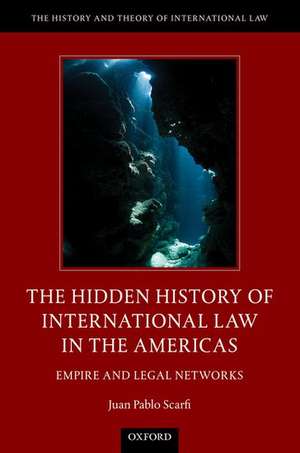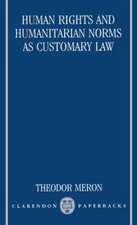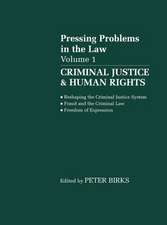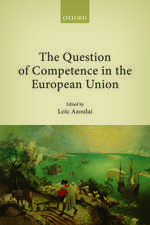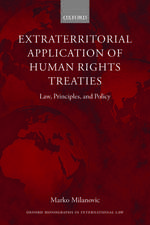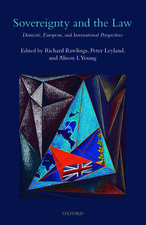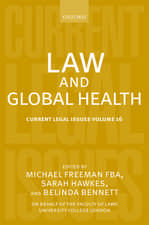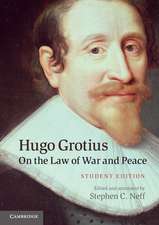The Hidden History of International Law in the Americas: Empire and Legal Networks: History and Theory of International Law
Autor Juan Pablo Scarfien Limba Engleză Hardback – 4 mai 2017
Preț: 598.84 lei
Preț vechi: 858.81 lei
-30% Nou
Puncte Express: 898
Preț estimativ în valută:
114.60€ • 119.49$ • 95.24£
114.60€ • 119.49$ • 95.24£
Carte tipărită la comandă
Livrare economică 10-15 martie
Preluare comenzi: 021 569.72.76
Specificații
ISBN-13: 9780190622343
ISBN-10: 0190622342
Pagini: 280
Dimensiuni: 236 x 157 x 23 mm
Greutate: 0.54 kg
Editura: Oxford University Press
Colecția OUP USA
Seria History and Theory of International Law
Locul publicării:New York, United States
ISBN-10: 0190622342
Pagini: 280
Dimensiuni: 236 x 157 x 23 mm
Greutate: 0.54 kg
Editura: Oxford University Press
Colecția OUP USA
Seria History and Theory of International Law
Locul publicării:New York, United States
Recenzii
Scarfi has provided thus far, possibly the most complete and detailed history of how international law evolved in the American continent.
In a remarkable and thoughtful book, Juan Pablo Scarfi examines what he calls the 'hidden history' of international law in the Americas in the early twentieth century... combines international and intellectual historyfocuses on the ideas, careers and interactions of several prominent international lawyers.
In reconstructing the ideology of Pan-Americanism, Juan Pablo Scarfi has shown how international law helps establish and secure hegemonic relations while also providing tools for those who might struggle to disturb them. With his insights into how and why the United States associated itself with international law from the nineteenth century on, Scarfi also recovers how the agenda of Latin Americans, notably Alejandro Alvarez, shaped outcomes. A brilliant debut.
Juan Pablo Scarfi has provided a fascinating and detailed insight into the interplay between international law and politics during the crucial half-century preceding World War II. He sheds valuable new light on U.S.-Latin American relations during that period, and especially on the controversies over the Monroe Doctrine.
The Hidden History of International Law in the Americas is an important contribution to the interwoven history of imperialism and international law. Juan-Pablo Scarfi has performed a valuable service by un-ravelling the complex network of individuals, institutions, and ideas that helped to legitimate the dominance of the United States in the Western Hemisphere during the early twentieth century.
A deeply-researched eye-opening account of the interaction between U.S. imperialism and Pan-American aspirations in the making of international law in the Western Hemisphere. It offers a new angle into perennial inquiries about U.S.-Latin American relations, and a model for transnational intellectual history.
In a remarkable and thoughtful book, Juan Pablo Scarfi examines what he calls the 'hidden history' of international law in the Americas in the early twentieth century... combines international and intellectual historyfocuses on the ideas, careers and interactions of several prominent international lawyers.
In reconstructing the ideology of Pan-Americanism, Juan Pablo Scarfi has shown how international law helps establish and secure hegemonic relations while also providing tools for those who might struggle to disturb them. With his insights into how and why the United States associated itself with international law from the nineteenth century on, Scarfi also recovers how the agenda of Latin Americans, notably Alejandro Alvarez, shaped outcomes. A brilliant debut.
Juan Pablo Scarfi has provided a fascinating and detailed insight into the interplay between international law and politics during the crucial half-century preceding World War II. He sheds valuable new light on U.S.-Latin American relations during that period, and especially on the controversies over the Monroe Doctrine.
The Hidden History of International Law in the Americas is an important contribution to the interwoven history of imperialism and international law. Juan-Pablo Scarfi has performed a valuable service by un-ravelling the complex network of individuals, institutions, and ideas that helped to legitimate the dominance of the United States in the Western Hemisphere during the early twentieth century.
A deeply-researched eye-opening account of the interaction between U.S. imperialism and Pan-American aspirations in the making of international law in the Western Hemisphere. It offers a new angle into perennial inquiries about U.S.-Latin American relations, and a model for transnational intellectual history.
Notă biografică
Juan Pablo Scarfi is a Research Associate at the Argentine National Scientific and Technical Research Council (CONICET), and teaches international relations and international law at the School of Politics and Government at the National University of San Martín, Argentina. He completed his PhD at the University of Cambridge in 2014. He was a Visiting Scholar at University College London (Institute of the Americas) and Columbia University, as well as a Postdoctoral Fellow at the Center for Intellectual History in the National University of Quilmes. He is the author of El imperio de la ley: James Brown Scott y la construcción de un orden jurídico interamericano (2014) and co-editor of Cooperation and Hegemony in US-Latin American Relations: Revisiting the Western Hemisphere Idea (2016).
